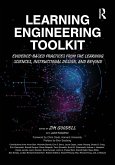Jeroen J. G. van Merrienboer (The Netherland Maastricht University, Paul A. Kirschner (Open Univeristy of the Netherlands), Jimmy Frerejean
Ten Steps to Complex Learning
A Systematic Approach to Four-Component Instructional Design
Jeroen J. G. van Merrienboer (The Netherland Maastricht University, Paul A. Kirschner (Open Univeristy of the Netherlands), Jimmy Frerejean
Ten Steps to Complex Learning
A Systematic Approach to Four-Component Instructional Design
- Broschiertes Buch
- Merkliste
- Auf die Merkliste
- Bewerten Bewerten
- Teilen
- Produkt teilen
- Produkterinnerung
- Produkterinnerung
Ten Steps to Complex Learning presents a path from an educational problem to a solution in a way that students, design practitioners, and researchers can understand and easily use.
Andere Kunden interessierten sich auch für
![Ten Steps to Complex Learning Ten Steps to Complex Learning]() Jeroen J. G. van Merrienboer (The Netherland Maastricht UniversityTen Steps to Complex Learning38,99 €
Jeroen J. G. van Merrienboer (The Netherland Maastricht UniversityTen Steps to Complex Learning38,99 €![Essentials of Online Course Design Essentials of Online Course Design]() Marjorie VaiEssentials of Online Course Design39,99 €
Marjorie VaiEssentials of Online Course Design39,99 €![Data Analytics and Adaptive Learning Data Analytics and Adaptive Learning]() Data Analytics and Adaptive Learning168,99 €
Data Analytics and Adaptive Learning168,99 €![Needs Assessment for Learning and Performance Needs Assessment for Learning and Performance]() Jill E. StefaniakNeeds Assessment for Learning and Performance55,99 €
Jill E. StefaniakNeeds Assessment for Learning and Performance55,99 €![Learning Engineering Toolkit Learning Engineering Toolkit]() Learning Engineering Toolkit78,99 €
Learning Engineering Toolkit78,99 €![International Handbook of E-Learning Volume 2 International Handbook of E-Learning Volume 2]() International Handbook of E-Learning Volume 2454,99 €
International Handbook of E-Learning Volume 2454,99 €![Utilizing a 5-Stage Learning Model for Planning and Teaching Online Courses Utilizing a 5-Stage Learning Model for Planning and Teaching Online Courses]() Riad S. AisamiUtilizing a 5-Stage Learning Model for Planning and Teaching Online Courses183,99 €
Riad S. AisamiUtilizing a 5-Stage Learning Model for Planning and Teaching Online Courses183,99 €-
-
-
Ten Steps to Complex Learning presents a path from an educational problem to a solution in a way that students, design practitioners, and researchers can understand and easily use.
Produktdetails
- Produktdetails
- Verlag: Taylor & Francis Ltd
- 4 ed
- Seitenzahl: 462
- Erscheinungstermin: 8. August 2024
- Englisch
- Abmessung: 229mm x 152mm x 25mm
- Gewicht: 656g
- ISBN-13: 9781032333113
- ISBN-10: 1032333111
- Artikelnr.: 70148501
- Herstellerkennzeichnung
- Libri GmbH
- Europaallee 1
- 36244 Bad Hersfeld
- gpsr@libri.de
- Verlag: Taylor & Francis Ltd
- 4 ed
- Seitenzahl: 462
- Erscheinungstermin: 8. August 2024
- Englisch
- Abmessung: 229mm x 152mm x 25mm
- Gewicht: 656g
- ISBN-13: 9781032333113
- ISBN-10: 1032333111
- Artikelnr.: 70148501
- Herstellerkennzeichnung
- Libri GmbH
- Europaallee 1
- 36244 Bad Hersfeld
- gpsr@libri.de
Jeroen J. G. van Merriënboer (1959-2023) was Emeritus Professor of Learning and Instruction at Maastricht University, The Netherlands. Before retiring, he was Research Director of the Graduate School of Health Professions Education (SHE) at Maastricht University. He also held honorary positions at the University of Bergen, Norway, and the Open University of the Netherlands. He has published over 450 journal articles and book chapters in the areas of learning and instruction and medical education. Paul A. Kirschner (1951) is Emeritus Professor of Educational Psychology at the Open University of the Netherlands as well as Honorary Doctor (Doctor Honoris Causa) at the University of Oulu, Finland, and Guest Professor at Thomas More University of Applied Sciences, Belgium. He owns his own educational consultancy company kirschner-ED and has published more than 400 journal articles, books, and book chapters in the areas of educational psychology, learning, and instruction. Jimmy Frèrejean (1986) is Assistant Professor at the Faculty of Health, Medicine and Life Sciences at Maastricht University, The Netherlands. Alongside his teaching and research on instructional design at the School of Health Professions Education, Jimmy actively contributes to the Maastricht University Medical Center and Academy as an educational consultant. He specializes in simulation-based education, coordinates a national lifelong learning program for healthcare professionals, and is part of the TRISIM expert group on training, research, and innovation in simulation-based education in healthcare.
1. A New Approach to Instruction 2. Four Blueprint Components 3. Ten Steps
4. Step 1: Design Learning Tasks 5. Step 2: Design Performance Assessments
6. Step 3: Sequence Learning Tasks 7. Step 4: Design Supportive Information
8. Step 5: Analyze Cognitive Strategies 9. Step 6: Analyze Mental Models
10. Step 7: Design Procedural Information 11. Step 8: Analyze Cognitive
Rules 12. Step 9: Analyze Prerequisite Knowledge 13. Step 10: Design
Part-Task Practice 14. Domain-General Skills 15. Programs of Assessment 16.
Closing Remarks Appendices
4. Step 1: Design Learning Tasks 5. Step 2: Design Performance Assessments
6. Step 3: Sequence Learning Tasks 7. Step 4: Design Supportive Information
8. Step 5: Analyze Cognitive Strategies 9. Step 6: Analyze Mental Models
10. Step 7: Design Procedural Information 11. Step 8: Analyze Cognitive
Rules 12. Step 9: Analyze Prerequisite Knowledge 13. Step 10: Design
Part-Task Practice 14. Domain-General Skills 15. Programs of Assessment 16.
Closing Remarks Appendices
1. A New Approach to Instruction 2. Four Blueprint Components 3. Ten Steps
4. Step 1: Design Learning Tasks 5. Step 2: Design Performance Assessments
6. Step 3: Sequence Learning Tasks 7. Step 4: Design Supportive Information
8. Step 5: Analyze Cognitive Strategies 9. Step 6: Analyze Mental Models
10. Step 7: Design Procedural Information 11. Step 8: Analyze Cognitive
Rules 12. Step 9: Analyze Prerequisite Knowledge 13. Step 10: Design
Part-Task Practice 14. Domain-General Skills 15. Programs of Assessment 16.
Closing Remarks Appendices
4. Step 1: Design Learning Tasks 5. Step 2: Design Performance Assessments
6. Step 3: Sequence Learning Tasks 7. Step 4: Design Supportive Information
8. Step 5: Analyze Cognitive Strategies 9. Step 6: Analyze Mental Models
10. Step 7: Design Procedural Information 11. Step 8: Analyze Cognitive
Rules 12. Step 9: Analyze Prerequisite Knowledge 13. Step 10: Design
Part-Task Practice 14. Domain-General Skills 15. Programs of Assessment 16.
Closing Remarks Appendices









